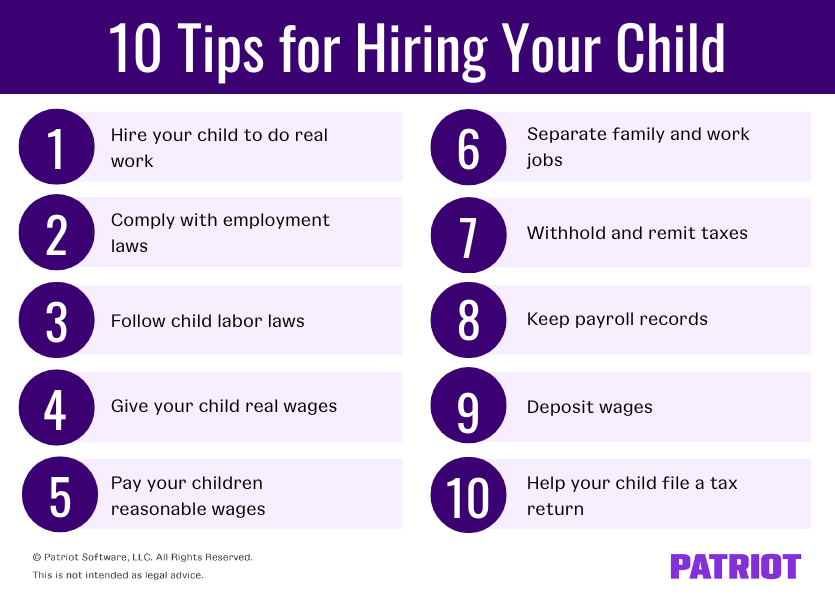Do you daydream about working with family members? You may consider hiring your child if you’re a small business owner. That way, you can show them the ins and outs of your business and the importance of hard work. At the same time, you gain an extra set of hands to get tasks done (win-win-win!).
Not to mention, there are other benefits to hiring your child (e.g., you can deduct their wages as a business expense). But, the IRS is suspicious of business deductions for wages paid to children.
Hiring your children is only beneficial if you do it correctly. Read on for 10 tips to hire your child the right way.
Hiring your child: 10 Tips to do it the right way
Want to welcome your child on board your business? Great! Before you do, check out the following tips to help you keep things legal.
Keep in mind that these tips only apply to hiring your children. They do not apply to hiring nieces, nephews, cousins, or any other family members.

1. Hire your child to do real work
You must make sure your child is a real employee. This means your child should do actual work for your business.
The work your child does must be normal and necessary. Their tasks don’t have to make or break your business, but they should be common and helpful.
For example, you might hire your tech-savvy child to help with your business’s website and social media accounts. Your child performs common and helpful tasks for your business, even if the tasks aren’t directly related to your products or services.
What if you have your child do tasks that are unrelated to your business, such as running personal errands? This won’t count as doing work for your business. The IRS will likely catch this and deny your deduction for the child’s wages.
If your child does not actually do any work for your business, you cannot simply pay them to claim a business deduction.
You should create an employment contract that your child signs, just as you should do with other employees. The contract should list the tasks that you hired your child to do. That way, you have a paper trail proving that your child is a real employee.
2. Comply with employment laws
Treat your child the same way you would treat other employees. This means you must follow employment laws and file all required forms.
All employers need to have an Employer Identification Number (EIN). Your EIN identifies your company on business and tax documents. If your child is your first hire, make sure you apply for an EIN.
When hiring your children, have them fill out Form W-4 and state W-4 forms. Keep these forms on file in case you ever need documentation.
During the hiring process, you and your child should also fill out Form I-9. Employers use Form I-9 to verify the identity and work eligibility of the employee. You know your child’s identity and work eligibility, but all employees and employers must fill out this form.
Follow any other required onboarding and IRS document retention requirements. You should not give special hiring treatment to your child.
3. Follow child labor laws
When hiring children under the age of 18, you must follow child labor laws. Child labor laws dictate when children can work, what jobs they can do, and how much you can pay them.
For example, only children 18 and older can do jobs that are considered hazardous. Children under 18 are also prohibited from doing excessive amounts of work during the school year.
In general, make sure the job is appropriate for the child’s age. You should not hire your eight-year-old to drive a forklift (no matter how much they beg you!).
Check with the U.S. Department of Labor and state agencies for more information on child labor laws.
4. Give your child real wages
You must give your child actual wages. Things that do not count as wages include college tuition, other education, and food.
Meals and education do not count as wages because they are considered part of normal parental support. Simply put, the IRS wants you to feed and educate your children regardless of employing them.
Remember that you can deduct your children’s wages, but only if you pay real wages and if the children did real work.
You might want to consider paying your children by check or direct deposit instead of cash (more on this later). These two methods create a “paper trail.” If there are questions about your children’s wages, you can produce records.
5. Pay your children reasonable wages
When hiring your children, you must pay them reasonable wages. You cannot pay your child large amounts simply because you’re related.
For example, you hire your child to do landscaping at your business. You pay $25 per hour for the work. However, the average wage for your area is $10 per hour for landscapers. Paying your child $25 per hour is probably not reasonable.
You can consult local job listings or job agencies to help you determine a reasonable wage.
On the other side of the spectrum, you should pay your child at least minimum wage. You might be able to pay your child a youth minimum wage. The federal youth minimum wage is $4.25 per hour for any employees under the age of 20. However, the youth minimum wage only applies to the first 90 days of employment. After 90 days, you should increase your child’s wages to the regular minimum wage. Also, your state might have youth minimum wage laws that you need to follow.
6. Separate family and work jobs
When hiring your child, remember to keep household and business tasks separate. This separation will help organize your small business finances.
If you give your child money for household chores, you cannot deduct those wages as a business expense. Household chores are considered part of regular parental training and discipline, not a business.
Let’s say you hire your child to clean your business. You can deduct the wages you pay as a business expense.
You also have your child clean your home. Even though the child is doing the same task, you cannot deduct any money you give your child for cleaning the house.
7. Withhold and remit taxes
When you hire a child, taxes might be different than with other employees. But, you must withhold income taxes from your child, regardless of age.
If you own a sole proprietorship or partnership where both owners are the child’s parents, the child is not subject to Social Security and Medicare taxes until age 18. You do not need to pay the employer contribution for your children on payroll.
If you own a corporation or partnership that has nonparent partners, the child is subject to Social Security and Medicare taxes. You must also pay the employer contribution.
No matter your business structure, if your child is 18 or older, you must withhold Social Security and Medicare taxes.
If your child is under age 21, you do not have to pay federal unemployment taxes (FUTA tax).
The IRS has a page about hiring family members that can help you understand payroll and income tax obligations.
8. Keep payroll records
You should always keep accurate and complete payroll records for all your employees.
Payroll records should include hours worked, wages earned, and taxes withheld. Give each employee a basic pay stub and keep this information on file.
Accurate records will help you if there are ever questions about your child. You can show how often your child worked, how much they earned, and how much tax you withheld from their wages.
9. Deposit wages
Depositing wages in a child’s bank account shows that the child really did receive wages. When wages are deposited, the account will have a record of how much money was deposited and where it came from. If you simply hand cash to your child, there is no payment record.
For example, you can deposit wages into a ROTH IRA or a Section 529 college savings plan. This way, you can help your children prepare for college and retirement. Depositing wages in these accounts is legal. You will also have records that show that your child received their wages.
10. Help your child file a tax return
Despite your child’s age, they should file an annual income tax return. You can help your child fill out the return.
When you paid your child, you should have withheld and remitted income taxes. Depending on how much your child earned during the year, they might be able to get an income tax refund once they file their return.
Patriot’s online payroll software lets you easily pay your employees. You and your employees can access digital payroll records, including pay stubs. Try it for free today!
This article has been updated from its original publication date of May 13, 2016.
This is not intended as legal advice; for more information, please click here.



